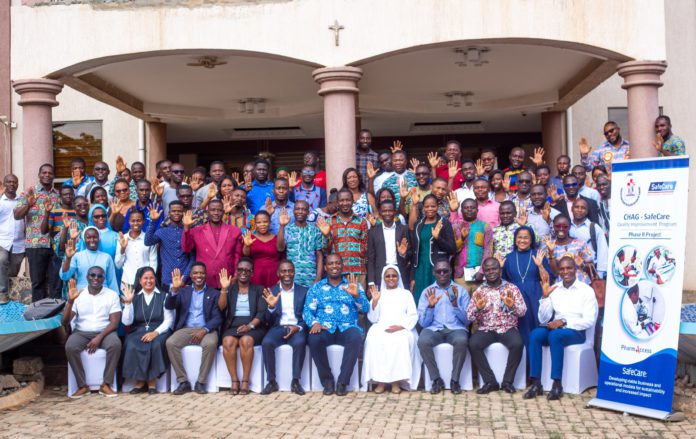The Christian Health Association of Ghana (CHAG) has engaged close to 2000 management members of its facilities to take decisive steps towards the full adoption, ownership, and institutionalization of the SafeCare Quality Improvement program in all health facilities under CHAG for sustained and continuous improvement.
The nationwide engagement meeting of all healthcare facility management members forms a major step of the program’s Phase II project, “Developing viable business and operational models for sustainability and increased impact.”
Speaking at the forum to discuss with the facilities management members about the sustainable adoption approach CHAG is taking to own and continue the ISQua-accredited SafeCare international standards locally, the Executive Director of CHAG, Dr. Peter Yeboah, said that CHAG member facilities are now regarded as the game changers in quality-based healthcare delivery in Ghana.
Dr Peter Yeboah emphasized that it has been four years since CHAG embarked on the transformative journey of SafeCare Quality Improvement, with facilities witnessing a paradigm shift in the provision of healthcare to its patients.

“Barely 4 years ago, we signed onto a social contract with PharmAccess. CHAG has been known over the years as the sanctuary of health, hope, and healing, a safeguard of quality in the entire health system. But we’ve operated far too long on the perception level – the perceived quality of care. We’re trusted and respected, but in an era of evidence-based actions, we cannot thrive only on hope and faith. As vital as they are, we need to demonstrate that our service provision is backed by science, and therefore, SafeCare was introduced. We wanted a structured, stepwise scientific way of measuring and benchmarking, identifying gaps, and coming up with innovative ways to address the gaps identified to ensure quality,” he said.
Dr. Peter Yeboah indicated that CHAG’s pioneering leadership has inspired and motivated the Ghana Health Service, the largest public healthcare provider in Ghana to adopt SafeCare quality standards as the surest way to achieving universal health coverage.
He emphasized that quality, as demonstrated through SafeCare, is a value proposition for the entire health sector, which Ghana should boldly adopt and institutionalize for all healthcare providers and facilities.
“Twenty years ago, Ghana embraced the National Health Insurance Scheme (NHIS). Thanks to CHAG’s pioneering role and innovative adoption of a community-based health insurance scheme, it was nationalized. Thankfully, we are now enjoying the benefits of the NHIS. Here we are today with another innovative program championed by a strong partnership between PharmAccess and CHAG.” Dr. Yeboah added.
Dr Peter Yeboah, who is also a health policy, planning, and financing expert, charged CHAG member facilities to promote and guard the quality standards attained while striving for further improvement and excellence on their SafeCare journey.

According to the World Health Organisation (WHO), about three million people die in the world annually from unsafe care. One in 10 patients is harmed in the process of seeking care, while an average of seven million people die in low- and middle-income countries from unsafe care.
This underscores the need for quality healthcare to reduce the preventable deaths recorded in the various health facilities due to poor service delivery.
It is in this light that PharmAccess Ghana, in partnership with CHAG, uses the SafeCare Standards to benchmark and improve the quality of care across its network of facilities. This collaboration aims to ensure that healthcare services provided at CHAG facilities meet international quality standards, thereby improving patient outcomes and overall healthcare delivery in Ghana.
In 2020, trained ISQua-accredited SafeCare assessors were deployed to support facility managers in over 330 CHAG hospitals and clinics nationwide in improving quality. They also conducted a series of assessments using the SafeCare standards to ensure quality service delivery. The outcomes have been impressive, with 91% of the facilities demonstrating improvement in their scores, which impacts the delivery of care in these facilities.
On his part, the Country Director for PharmAccess Ghana, Dr. Maxwell Antwi, revealed that the Ghana Health Service is gradually adopting, scaling up, and nationalizing SafeCare.
He indicated that “there is a collective anticipation of a future where the pursuit of quality healthcare is not a plea but an inherent aspect of the nation’s healthcare ethos. The journey toward quality healthcare for all is an ongoing endeavor, and these collaborative efforts are instrumental in forging a path toward a healthier and more resilient nation.”
Dr. Maxwell Antwi also said that SafeCare saves lives by improving health outcomes and reducing risks, and it improves the efficiency in the operations of healthcare facilities.
He added that some healthcare facility managers have adopted the SafeCare standards as a guide to run the operational systems of their hospitals and clinics.
Some facility managers, including administrators, who benefited from the program are excited about the quality outcomes. They commended CHAG and PharmAccess for rolling out SafeCare in Ghana.
An administrator from one of the facilities said, “For us, SafeCare is very helpful; everyone in this facility is committed to quality. We don’t have any other option than to be committed to quality care. If the client is happy that the services are safe and he or she is protected, we will have more clients and sustain the facility. Quality care minimizes complaints and even legal suits.”
Another administrator also said, “We have bolstered our team with strategic expertise to fortify our quality assurance measures. A dedicated risk manager now evaluates quality and provides invaluable guidance to our management. Additionally, we have enlisted the expertise of a seasoned physiotherapist and an adept equipment manager to oversee equipment management seamlessly. These strategic additions were prompted by meticulous assessments that pinpointed crucial gaps in our operations.”

The successful completion of the SafeCare Quality Improvement engagements by about two thousand CHAG facility managers marks a significant advancement in Ghana’s healthcare sector. The adherence to international quality standards will ultimately improve patient outcomes and reinforce Ghana’s journey towards achieving UHC by 2030. The commitment to continuous improvement and quality care will pave the way for a healthier and more buoyant nation.
SafeCare Director, Ghana, Bonifacia Benefo Agyei, emphasized the importance of ownership and commitment to continuous improvement.
According to her, the quality of healthcare delivery must be the key responsibility of healthcare facility managers.
She stated, ‘The full adoption of SafeCare standards by CHAG facilities marks a significant step towards achieving excellence in healthcare delivery. It is not just about reaching higher scores but also about fostering a culture of quality and accountability. Quality is the responsibility of those in authority. The ownership of quality is not from bottom to top. It must be from the top. The leadership for quality is from the top.”
Deputy Executive Director of CHAG, Dr James Duah further encouraged the facility owners to ensure a sustained, implementation, ownership, and institutionalized SafeCare. He advised all facilities to have quality managers whose job it shall be to ensure that the facilities operate and adhere to the highest quality standards.
“If you have the flexibility of co-opting members into your management structure, then your quality managers must be co-opted into management so that every management he/she will sit in it. Alternatively, make a management member responsible for quality.” Dr Duah noted.
It is time to make quality healthcare a key part of management strategies in healthcare delivery in Ghana.

